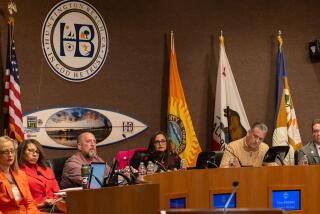High School Journalist Faces Firing
- Share via
When high school journalist Ann Long sent a recent edition of her school’s newspaper to the printer, she hoped her profile of three gay students would generate some discussion in the hallways.
But she didn’t expect to be punished for writing the article.
According to Long and her mother, officials at Troy High School in Fullerton told the senior that by Thursday she must resign or face being fired from her shared post as editor in chief of the Oracle.
Assistant Principal Joseph D’Amelia, who Long said delivered the ultimatum, declined to comment, deferring questions to Patricia Howell, deputy superintendent for the Fullerton Joint Union High School District.
Howell, who wouldn’t discuss Long by name, said district and school officials did not object to the story’s content. She said Long, 18, was being punished for violating the ethical standards of the journalism class and a state education code that prohibits asking students about their sexuality without parental permission.
“We’re not saying there is anything morally wrong with the article,” she said. “Freedom of speech is not at issue. Confidentiality and privacy rights are the issue.”
It is a position that has left Long defiant and legal experts contending that the state law applies to faculty but not students.
“I don’t think I’ve done anything that merits me stepping down,” said Long, who vowed not to surrender her position. “Perhaps I should have called the parents to interview them for the story, but I don’t feel like I should have been obligated to get their permission to write it. These students chose to talk to me.”
At issue is a Dec. 17 article that chronicled the decisions of three students -- two 18-year-olds and a 15-year-old -- to reveal their homosexuality and bisexuality to family and friends. All three spoke to Long knowing their names would be used.
According to Long, her journalism teacher, Georgette Cerrutti, worked closely with her on drafts of the article for more than a month, at one point discussing with her the impact it might have on the students’ families.
Long said Cerrutti never told her she needed to get the parents’ approval.
On Monday, Long said, she was summoned to D’Amelia’s office, where he and Cerrutti admonished her for not seeking the parents’ permission.
“He told me I either had to resign and make an example of myself for failing to do my job,” Long said of D’Amelia, “or that I would be removed.”
In meetings Tuesday with Long’s parents, D’Amelia and Troy Principal Chuck Maruca reaffirmed the school’s stance, Long and her mother said.
Maruca and Cerrutti did not return calls seeking comment.
Howell said journalism students are taught to be cautious when writing stories that address other students’ private lives. She said Long had violated the section of the California education code that requires written parental permission before asking students questions about their or their parents’ “personal beliefs or practices in sex, family life, morality, and religion,” as the code states.
“Anytime a school policy or the education code is violated, there obviously has to be some consequences,” Howell said.
Howell declined to comment on whether Cerrutti had told Long of that requirement or whether the teacher had asked to see the parents’ written permission.
Experts on the rights of student journalists said the district was wrong to apply that part of the education code to a student.
“The school has no right to punish this student,” said lawyer Mark Goodman, executive director of the Student Press Law Center in Arlington, Va. “A student has the right to talk about their private life, and a student journalist has the right to report on it. Ultimately, there are some things that are not within a school’s right to control.”
Doug Mirell, a 1st Amendment lawyer in Los Angeles, said that because minors legally could not waive their right to privacy in discussing matters such as sexual orientation, journalists must get a parent’s permission. Mirell said it would be up to a parent, and not a school, to complain about the privacy breach.
The parents of the 15-year-old whom Long interviewed could not be reached for comment.
Goodman and Michael Hersher, a state Department of Education lawyer, said they had never heard of a school trying to apply that section of the education code to a student journalist. They cited another section of the code that places the responsibility on faculty advisors “to maintain professional standards of English and journalism” in school newspapers.
Long’s mother, Daisy, said she was planning to take up the matter with district officials.
More to Read
Sign up for Essential California
The most important California stories and recommendations in your inbox every morning.
You may occasionally receive promotional content from the Los Angeles Times.














